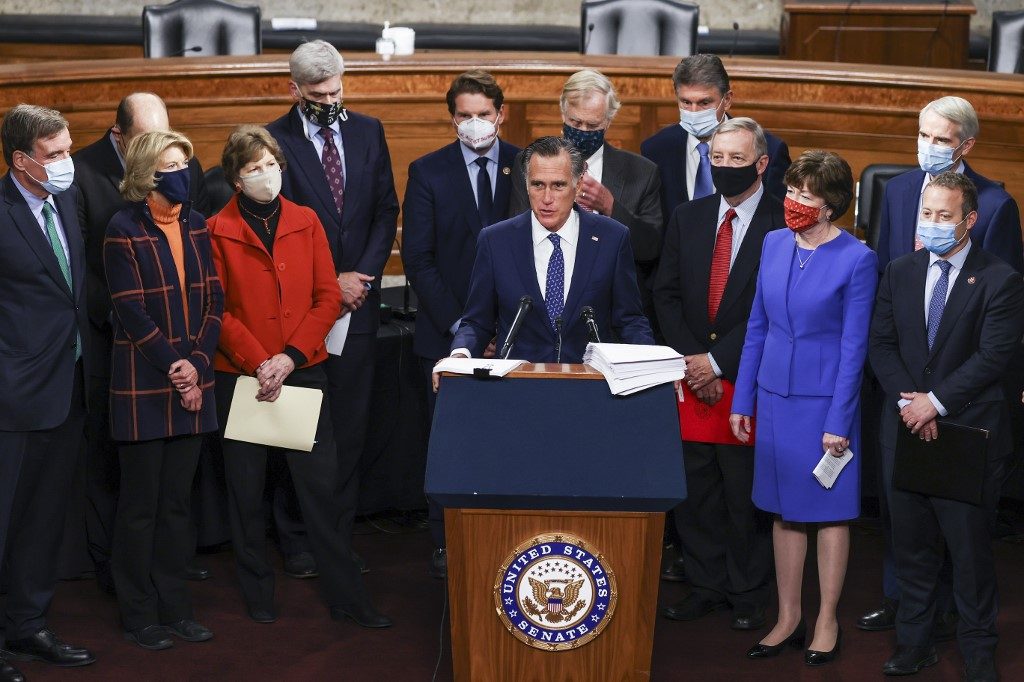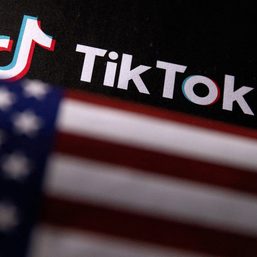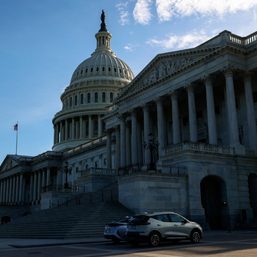SUMMARY
This is AI generated summarization, which may have errors. For context, always refer to the full article.

United States lawmakers on Monday, December 14, introduced a pair of stimulus proposals costing $908 billion that have the support of Democratic and Republican lawmakers and represent a final push to get new aid for the pandemic-ravaged economy approved before Congress heads home for the holidays.
The bills would fund programs to help the unemployed, small businesses, and state and local governments while offering liability to some employers, but their chances for passage in the final weeks of President Donald Trump’s term remain unclear.
“We have people hurting right now. We have an emergency, so let’s do what we need to do to take care of the emergency,” Republican Senator Mitt Romney said in a press conference announcing the plans.
The proposal would follow up on the $2.2-trillion CARES Act rescue package passed in the COVID-19 pandemic’s early days, which was credited with keeping the US economy from a more severe downturn.
But its main provisions expired in recent months, and as the United States faces skyrocketing COVID-19 cases, lawmakers from both parties as well as the Trump administration have been unable to agree on how much to spend in a new stimulus measure, and what to spend it on.
“Let’s not go home for Christmas, without passing this much-needed relief for the American people,” said Republican Senator Susan Collins, who is part of the 50-member bipartisan Problem Solvers Caucus that backs the measures.
The proposal’s support within the Trump administration and from Republican Senate Majority Leader Mitch McConnell is unclear.
But Democratic House Speaker Nancy Pelosi said in a statement that “Congress must come together and reach bipartisan agreement this week on coronavirus legislation to save the lives and livelihoods of the American people.”
Flurry of proposals
Lawmakers are up against two deadlines: the end of the week, when their session ends, and December 26, when the last benefit programs paid for by the CARES Act that support millions of unemployed people will expire.
The latest proposal contains elements of the original CARES Act, including expanded $300-per-week unemployment payments for 16 weeks and a refresh of the Paycheck Protection Program of loans and grants to small businesses.
Also included is $160 billion in funding for state and local governments to help them recover from the pandemic, as well as liability protections for businesses facing lawsuits over COVID-19 exposure – both controversial issues in the negotiations.
Others have weighed in with plans in recent weeks, including Treasury Secretary Steven Mnuchin, who unveiled a proposal last week costing $916 billion.
However, that attracted little support from Democrats, and another suggestion from McConnell that aid to state and local governments as well as liability protections be excluded from the package was also turned down.
The US economy has seen mass layoffs and a sharp contraction in growth caused by the COVID-19 pandemic, and despite signs of recovery in recent months, analysts fear the resurgent virus will cause a renewed downturn just as the first vaccines are being rolled out.
Also on lawmakers’ minds is Democratic President-elect Joe Biden’s inauguration in January, and two elections in Georgia that same month that will decide whether Republicans maintain their majority in the Senate or if Democrats win a knife-edge lead. – Rappler.com
Add a comment
How does this make you feel?


![[Time Trowel] Evolution and the sneakiness of COVID](https://www.rappler.com/tachyon/2024/02/tl-evolution-covid.jpg?resize=257%2C257&crop=455px%2C0px%2C1080px%2C1080px)












There are no comments yet. Add your comment to start the conversation.